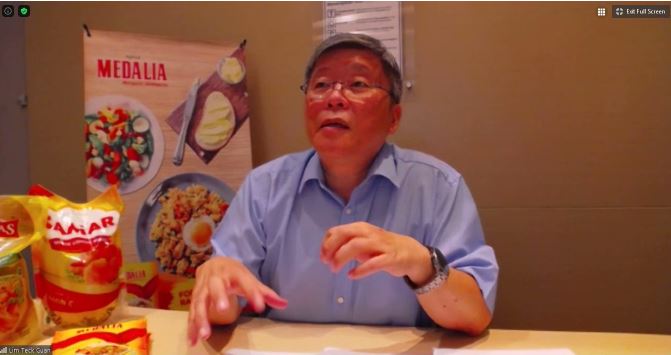
Apical Marunda, the Jakarta-based operations of Apical Group, held its first webinar on Zoom on June 17, 2020, themed “Healthy with Palm Oil”.
Palm oil is a highly efficient and productive crop with many uses and applications. Compared to other vegetable oil crops such as soya bean, rapeseed, sunflower, and olive, palm oil requires the least amount of land to produce the same quantity of vegetable oil. While palm oil accounts for only 6.6% of all cultivated land for vegetable oils, it covers 38% of the global production of vegetable oils and fats.
Indonesia and Malaysia are respectively the world’s largest and second largest palm oil producers, producing around a combined 85 percent of the global supply of palm oil. With its abundant natural resources, vast land and suitable tropical climate, Indonesia remains the world’s largest producer of palm oil.
With the advantage of being the world’s largest producer of palm oil, Indonesia is able to create economies of scale to meet the global demand for oils and fats, while supporting the livelihoods of countless farmers and communities.
In the webinar, General Manager of Apical Marunda, Lim Teck Guan shared that there still existed many consumers who were unaware of health benefits and significance of palm oil in our daily diet.
“Palm oil contains a balance of unsaturated fatty acids and saturated fatty acids, unlike other vegetable oils. Fat is a source of energy, and just like carbohydrates and protein, it is part of one’s balanced and healthy daily diet. Fat is one of the important elements in a healthy diet as fats are needed for the synthesis of cells and hormones, and absorption of vitamins A, D, E and K,” explained Mr Lim.
He further said, “We hope this series of webinars can help the public better understand the health benefits of palm oil.”
Fajar Marhendra, from the Apical Marunda’s Research & Development department, added that palm oil is found in everyday products. Commonly recognized in its liquid form (e.g. cooking oil), palm oil is also available in semi-solid and solid form (e.g. margarine), and is one of the ingredients in the manufacture of foods such as ice creams, breads, cookies, chocolate preparations, and other culinary ingredients. Despite palm oil’s prevalence in every day foods, many people are not fully aware they are already consuming palm oil daily.
“Palm oil is the most consumed vegetable oils and fats globally. Because it is available in liquid, semi-solid and solid forms, palm oil is very versatile, functional and used in many applications. Its benefits to daily food preparation also includes taste. For example, it is used to produce crispy and long-lasting fried foods with a smooth and soft texture,” said Mr Fajar.
Palm oil is not only used in the kitchen, but also in many daily activities and products that such as soaps, toothpaste, and even biodiesel. Recognizing its high productivity, versatility and many benefits, Mr Lim Teck Guan hopes there can be increased awareness on the uses of palm oil among the public.
About Apical Products
Apical produces fresh, quality palm oil products through the processing of CPO in our internationally certified refineries. Our palm oil products are Hazard Analysis Critical Control Point (HACCP) and FSCC 22000 certified for food safety, and halal and kosher certified.
We also adhere to PORAM’s (Palm Oil Refiners Association of Malaysia) standards for PPO and can create and tailor made our product specifications according to customers’ unique requirements. Through continuous innovation and improvement, Apical is able to meet food manufacturers’ stringent quality requirements for oils and fats.
Our products are available in Lotte Mart, and Carrefour, etc. under brands such as: Harumas, Camar, Vitas margarine, and Medalia margarine.

